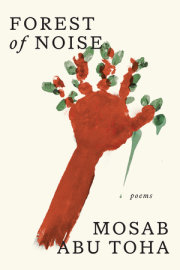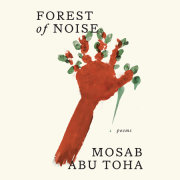A New York Times Notable Book • A The New Yorker Best Book & Essential Read of 2024 • A Library Journal Best Book of Poetry • An Electric Lit Top Five Poetry Collection of 2024
“A powerful, capacious, and profound book, rich in intelligence and lyric dexterity that fuses poetry’s two great promises, wonder and testament, into crystalline focus.” —Ocean Vuong, author of Time Is a Mother and On Earth We’re Briefly Gorgeous
“The poems in Mosab Abu Toha’s Forest of Noise are urgent, prayerful howls in the bleakest of nights. Necessary, and wrought out of both terror and truth, these poems sing and weep in a rough and haunting harmony. Abu Toha’s work begs the reader to pay close attention as each poetic line is, at its heart, a lifeline to survival.” —Ada Limón, US Poet Laureate, author of The Hurting Kind
“If literature has any power to change the world or resist injustice, I think it must lie in the astounding poems of Mosab Abu Toha.” —Noreen Masud, The Guardian
“Abu Toha, a notable Palestinian poet, speaks of the besieged and the dead in a register that veers deftly, often brutally, between the plainspoken and the lyrical. . . . In this penetrating collection, poetry is not a balm; it is an elegy.” —The New Yorker, “Best Books of 2024”
“This harrowing collection highlights the importance of bearing poetic witness in times of violence and oppression. . . . [Abu Toha] uses stark diction, a compassionate tone, and an unshrinking documentary eye to construct this haunting book.” —Electric Literature, “Best Poetry Collections of 2024”
“[Abu Toha’s poems] bore not just the stamp of urgent witness but also provided a way of seeing, a way of preserving humanity, that seemed destined to be completely and violently erased, buried, under the rubble. . . . These poems are reports or memorials or testimonies, yes, but they rise as a cry, above all the sounds in this forest of noise, a cry for peace, peace, peace.” —Amitava Kumar, via Substack
“A relentless, restless drive to tell the stories of all those left behind. . . . [Abu Toha is] lit by an intensity… a kind of sober fever of witness, the compulsion of a bright-eyed Mariner. . . . This poetry is an act of witness, of reportage. . . . It’s poetry as memorial, too.” —Aida Edemariam, The Guardian
“How do despair and hope feed each other? When will it end? How can we make art amid the rubble? How can we not? … Mosab grapples with poetry’s ability to convey the horror of life in Gaza under Israeli assault. . . . When you reach [the] last words, close the book. Turn it over. Imagine the hand on the cover is the poet’s and clasp it. Reread the poems. Call, once more, for an end to genocide.” —Eman Quotah, The New Arab
“An unvarnished view of war and its repercussions... [Abu Toha's] work has visceral immediacy.” —Elisabeth Egan, The New York Times
“A split sensibility of whimsy and agony, wonder and torment. . . . What Abu Toha makes of this hard material is disarming. His voice tends to gentleness and wonder, nosing out beauty in all its small places… [and] syntax is warped and wrecked by the pace of destruction.” —Yasmine Seale, 4Columns
“This new collection from a renowned Palestinian poet offers a glimpse into life in a besieged Gaza and what it’s like to survive and find care, even hope, under the most dire of conditions.” —The New York Times, “24 Works of Poetry and Fiction to Read This Fall”
“Abu Toha takes up the mantle of both poet and historian, chronicling the violence he has inherited, witnessed, and survived… his poetry is both a blueprint and a legacy... unwavering.” —Destiny O. Birdsong, Poets & Writers Magazine
“Blistering and mournful... Abu Toha eloquently captures the brutality and urgency of the present.” —Publishers Weekly (starred review)
“More than any news reporting, this heartbreaking collection makes vividly real the suffering in Gaza and what it’s like to face huge, ongoing loss. . . . Abu Toha can be plainspoken, then turn around with a stark, horrific image that drops like hot coals. . . . One mourns with Abu Tohu as he asks his dead brother, 'Will my bones find you when I die?' Highly recommended.” —Library Journal (starred review)
“Harrowing but powerful. . . . As good poetry often does, Forest of Noise will require you to ask some of the most difficult questions of our time: What kind of world are we living in? What kind of world are we leaving to the children?” —BookPage (starred review)
“Mosab Abu Toha carries a vast library in his heart. His books hold the names of people and places covered in drones and rubble. His books hold letters, odes, reports, and elegies; generations of gardens and graves. Abu Toha opens his library to us in Forest of Noise. His poems resonate with undeniable immediacy upon a first reading and continue ringing more and more urgently with every subsequent reading. Abu Toha writes with a brilliance that makes anyone who encounters these astonishing poems both witness and kin.” —Terrance Hayes, author of So to Speak
“Heartbreaking, evocative, transformative poetry of witness to the horror of warfare. It happens in real time, as we turn pages. This is powerful, impactful poetry, a book you won’t soon forget. Forgetting is not an option. Buy two copies. One for yourself. Another for any soldier you might meet in the street.” —llya Kaminsky, author of Deaf Republic
“In Forest of Noise, his astonishing second book, Mosab Abu Toha is the essential poet embodying the humanity of Gaza, the precious hopes and dreams of all humans, the searing collective cries of children, the indelible honest conscience, the heart and soul. Miraculously he has continued speaking and writing through the horrific genocide of his people and beloved place. His elemental poems dissolve the empty rhetoric and posturing with simple, striking truth. Not blows. Who else among us founds a library in our early twenties? Today Mosab's books may be crushed, but his most powerful spirit is not.” —Naomi Shihab Nye, author of The Tiny Journalist








